Your Musafia Cremona Italy case was designed and built by Mr. Musafia and his assistants to exacting standards to last a long time. A few hints will ensure that you can expect the best from your investment over the long term.
DOES AND DONT'S!
Always close your case with the latch and zippers before transporting an instrument.
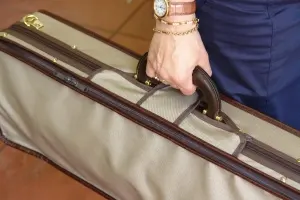
The case's designed safety parameters are met only with the case zipped and latched shut. In addition, remembering to always close the zippers and latch before use helps avoid accidental opening.
Do not pick the case up by the lid when open. The case was not designed to be handled this way and such action can weaken the structure.
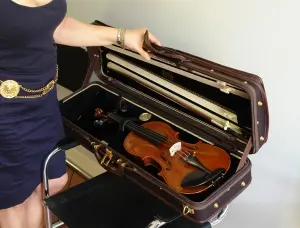
Please always properly close and zip up the case even when moving it a short distance.
Do not overload the music pocket, as this can cause excessive wear to the zippers, as well as strain the stitching and the structure of the case. If you are unable to easily close the zipper, remove some of the contents.
Do not attempt to clean the interior with solvents or air jets.
Never attempt to have the case repaired by anyone other than your Authorized Musafia dealer or the manufacturer without contacting us first. Unauthorized attempts at repair may void the warranty.
Keep the case closed with the latch when not in use. As with any case, leaving it open for extended periods especially if not fully supported on a level surface, can affect the alignment between the lid and bottom making it more difficult to close.
Fold the case latch down completely when the case is open to avoid it inadvertently coming into contact with the instrument when handled hastily.
Take care that the ribbons which keep the lid open are not caught between the lid and the bottom of the case when it is closed. If this occurs, the zipper can gradually wear through the ribbon, requiring premature replacement.
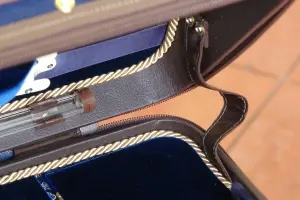
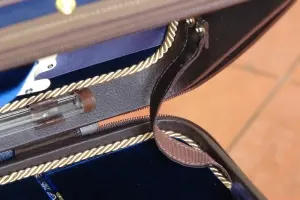
The ribbons that hold the lid open will fold into the case (2 img) upon closure if "accustomed" to it. If a ribbon on your Musafia case tends to fold out (1 img) push it into the case before closing it every time for a few days, and you'll see that it will tend to fold inwards by itself.
Never keep broken rosin inside the accessory boxes. In hot weather, rosin fragments will stick to the interior and can permanently ruin the lining.
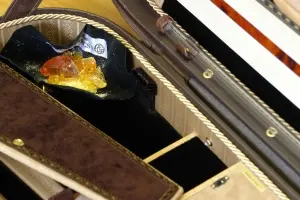
Never leave the case open with the instrument inside (whether attended to or not). Do not place the instrument in the case with the shoulder rest attached, even for a short time.
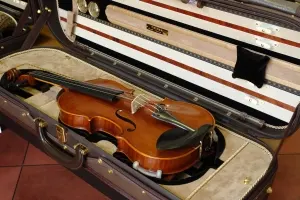
Especially teachers, in the course of lessons, tend to place their violin in the case with the shoulder rest attached, ready to grab for quick demonstration to the student. However, a false move can cause the lid to crash onto the violin...
Make sure that no foreign objects (paper clips, chunks of rosin, string tube caps, finer tuners, chinrest keys, coins, etc.) roam freely within the case. They may fall between the padding and the ribs of the instrument, posing great danger in case of even slight impact.
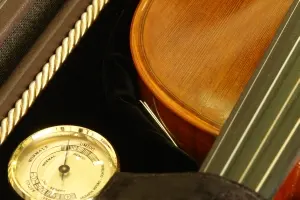
When we receive cases for maintenance, we often find small metal items like paper clips and safety pins adrift inside. This image helps clarify the damage risk.
Periodically check the handles, carrying straps, and their attachments for wear. In case of loose, worn, or broken components, the case must be repaired before further use: please contact us immediately. Continued use may place your instrument in danger and will void the warranty.
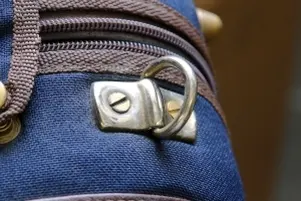
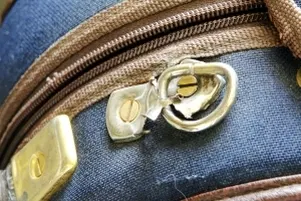
During the first few weeks of ownership, please always keep the case closed with the zippers to aid their ease of operation over the long term.
When the case eventually will need maintenance, contact us for this service promptly. A case which is used with a torn cover, for example, is subjected to water damage and will deteriorate much faster, requiring more costly repair, than if the cover is repaired immediately. Continued use of a case requiring maintenance or repair may void the warranty.
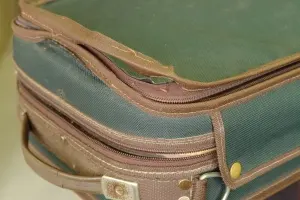
As long as the case cover is in good condition, it will provide adequate protection for the case structure. If it becomes torn or unstitched, it must be replaced as soon as possible.
When closing the case, make sure that the accessory box tabs and the leather instrument restraints (if present) are not caught between the lid and the bottom of the case.
Do not overfill the accessory boxes or attempt to insert items that don稚 fit. If the accessory lid does not close completely or properly, it may not remain closed when the case is used, allowing items to become adrift inside the case and posing potential risk to the instrument, as well as overstressing the hinges, which may come part over time.
Never cover the instrument with both the supplied velvet blanket and the optional pillow blanket. Together they will constitute excessive thickness. Use either one or the other.
Please wipe down the metal parts of the case exterior if they become wet in rain or snow. Failure to do so may result in premature corrosion, especially in areas affected by acid rain, such as the eastern third of the U.S., southeastern Canada, most of Eastern Europe from Poland northward into Scandinavia, the southeastern coast of China and Taiwan. Replacements are supplied free of charge upon request.
If you own a Lievissima case, do not hang anything onto the strap handles (keychains, luggage tags, charms, etc.) because they may cause premature wear and require replacement of the entire cover.